新标准大学英语综合教程3课文翻译_1_6
新标准大学英语综合教程3课后翻译 英译汉

Unit11.We all sensed we were coming to the end of our stay here,that we would never get a chance li ke this again,and we became determined not to waste it.Most important of course were the fina l exams in April and May in the following year.No one wanted the humiliation of finishing last in c lass,so the peer group pressure to work hard was strong.Libraries which were once empty after f ive o’clock in the afternoon were standing room only until the early hours of the morning,and guys wo re the bags under their eyes and their pale,sleepy faces with pride,like medals proving their dilig ence.我们都觉得在校时间不多了,以后再也不会有这样的学习机会了,所以都下定决心不再虚度光阴。
当然,下一年四五月份的期末考试最为重要。
我们谁都不想考全班倒数第一,那也太丢人了,因此同学们之间的竞争压力特别大。
以前每天下午五点以后,图书馆就空无一人了,现在却要等到天快亮时才会有空座,小伙子们熬夜熬出了眼袋,他们脸色苍白,睡眼惺忪,却很自豪,好像这些都是表彰他们勤奋好学的奖章。
2Tomorrow?It’s all a lie;there isn’t a tomorrow.There’s only a promissory note that we are often not ina position to cash.It doesn’t even exist.When you wake up in the morning it’ll be today again and allthe same rules will apply.Tomorrow is just another version of now,an empty field that will remai n sounless we start planting some seeds.Your time,which is ticking away as we speak(at about60se condsa minute chronologically;a bit faster if you don’t invest your time wisely),will be gone and you’llhave nothing to show for it but regret and a rear-view mirror full of“could haves”,“should h aves”and“would haves”.明天行吗?明天只是个谎言;根本就没有什么明天,只有一张我们常常无法兑现的期票。
新标准大学英语综合教程3课文翻译

新标准大学英语综合教程3课文翻译Unit 01 Working Holiday AbroadHow My Working Holiday Changed MeHayley1 Now that I have been home for a while and have had time to reflect on my working holiday in Vancouver, I’ve thought a lot about who I was before I left for Canada and who I am prese ntly.1 我回到家已经有一段时间了,有空回顾在温哥华的打工度假经历。
对于去加拿大之前的自我和如今的自我,我思考了很多。
2 Prior to leaving, I was not in a good place. I had suffered a lot of personal blows and felt emotionally stretched. I lost my grandma, my job and had two car crashes in five months. I needed something to change in my life, and that came in the form of a working holiday visa.2 出发前,我的境况不好。
个人生活上经受了许多打击,精神压力很大。
我失去了我的祖母,我的工作,5个月里遭遇两起车祸。
我需要生活得到改变,于是便有了打工度假签证这回事。
3 In less than three months I filled out the necessary paperwork, booked my plane ticket and fled Brisbane. I spent fifteen months living and working in Vancouver, Canada and eighteen months in total away from Australia. This is how that working holiday changed me and my life.3 在不到三个月的时间里,我填写了所需的表格,订好了机票,逃离布里斯班。
新标准英语3课后翻译
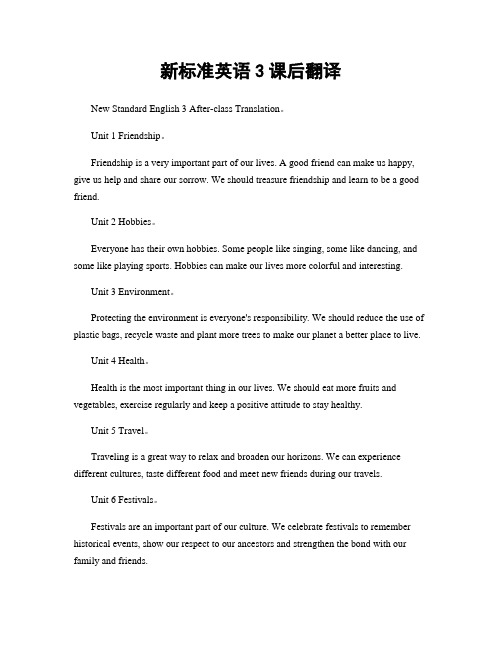
新标准英语3课后翻译New Standard English 3 After-class Translation。
Unit 1 Friendship。
Friendship is a very important part of our lives. A good friend can make us happy, give us help and share our sorrow. We should treasure friendship and learn to be a good friend.Unit 2 Hobbies。
Everyone has their own hobbies. Some people like singing, some like dancing, and some like playing sports. Hobbies can make our lives more colorful and interesting.Unit 3 Environment。
Protecting the environment is everyone's responsibility. We should reduce the use of plastic bags, recycle waste and plant more trees to make our planet a better place to live.Unit 4 Health。
Health is the most important thing in our lives. We should eat more fruits and vegetables, exercise regularly and keep a positive attitude to stay healthy.Unit 5 Travel。
新标准大学英语综合教程3 课文翻译(Unit1-6)
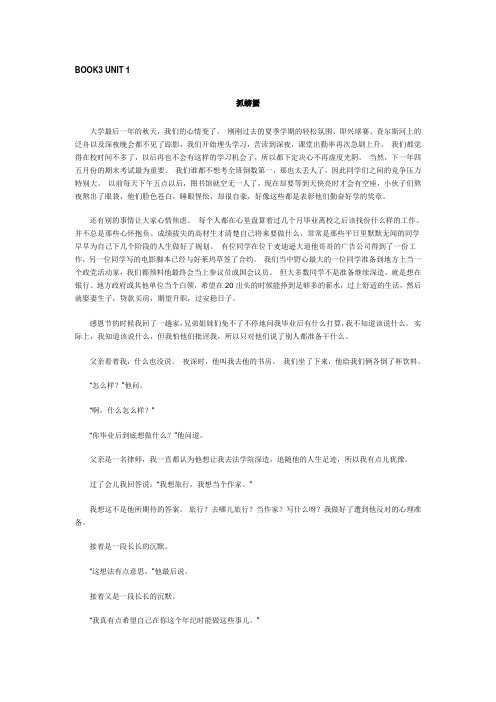
BOOK3 UNIT 1抓螃蟹大学最后一年的秋天,我们的心情变了。
刚刚过去的夏季学期的轻松氛围、即兴球赛、查尔斯河上的泛舟以及深夜晚会都不见了踪影,我们开始埋头学习,苦读到深夜,课堂出勤率再次急剧上升。
我们都觉得在校时间不多了,以后再也不会有这样的学习机会了,所以都下定决心不再虚度光阴。
当然,下一年四五月份的期末考试最为重要。
我们谁都不想考全班倒数第一,那也太丢人了,因此同学们之间的竞争压力特别大。
以前每天下午五点以后,图书馆就空无一人了,现在却要等到天快亮时才会有空座,小伙子们熬夜熬出了眼袋,他们脸色苍白,睡眼惺忪,却很自豪,好像这些都是表彰他们勤奋好学的奖章。
还有别的事情让大家心情焦虑。
每个人都在心里盘算着过几个月毕业离校之后该找份什么样的工作。
并不总是那些心怀抱负、成绩拔尖的高材生才清楚自己将来要做什么,常常是那些平日里默默无闻的同学早早为自己下几个阶段的人生做好了规划。
有位同学在位于麦迪逊大道他哥哥的广告公司得到了一份工作,另一位同学写的电影脚本已经与好莱坞草签了合约。
我们当中野心最大的一位同学准备到地方上当一个政党活动家,我们都预料他最终会当上参议员或国会议员。
但大多数同学不是准备继续深造,就是想在银行、地方政府或其他单位当个白领,希望在20出头的时候能挣到足够多的薪水,过上舒适的生活,然后就娶妻生子,贷款买房,期望升职,过安稳日子。
感恩节的时候我回了一趟家,兄弟姐妹们免不了不停地问我毕业后有什么打算,我不知道该说什么。
实际上,我知道该说什么,但我怕他们批评我,所以只对他们说了别人都准备干什么。
父亲看着我,什么也没说。
夜深时,他叫我去他的书房。
我们坐了下来,他给我们俩各倒了杯饮料。
“怎么样?”他问。
“啊,什么怎么样?”“你毕业后到底想做什么?”他问道。
父亲是一名律师,我一直都认为他想让我去法学院深造,追随他的人生足迹,所以我有点儿犹豫。
过了会儿我回答说:“我想旅行,我想当个作家。
”我想这不是他所期待的答案。
新标准大学英语3课文翻译
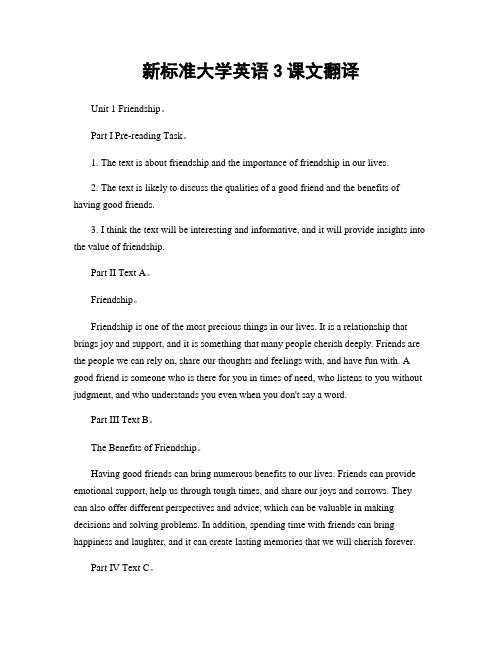
新标准大学英语3课文翻译Unit 1 Friendship。
Part I Pre-reading Task。
1. The text is about friendship and the importance of friendship in our lives.2. The text is likely to discuss the qualities of a good friend and the benefits of having good friends.3. I think the text will be interesting and informative, and it will provide insights into the value of friendship.Part II Text A。
Friendship。
Friendship is one of the most precious things in our lives. It is a relationship that brings joy and support, and it is something that many people cherish deeply. Friends are the people we can rely on, share our thoughts and feelings with, and have fun with. A good friend is someone who is there for you in times of need, who listens to you without judgment, and who understands you even when you don't say a word.Part III Text B。
新标准大学英语综合教程3课文翻译
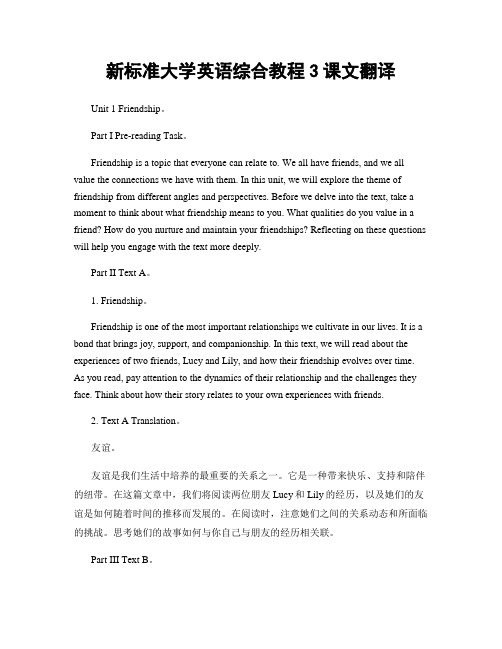
新标准大学英语综合教程3课文翻译Unit 1 Friendship。
Part I Pre-reading Task。
Friendship is a topic that everyone can relate to. We all have friends, and we all value the connections we have with them. In this unit, we will explore the theme of friendship from different angles and perspectives. Before we delve into the text, take a moment to think about what friendship means to you. What qualities do you value in a friend? How do you nurture and maintain your friendships? Reflecting on these questions will help you engage with the text more deeply.Part II Text A。
1. Friendship。
Friendship is one of the most important relationships we cultivate in our lives. It is a bond that brings joy, support, and companionship. In this text, we will read about the experiences of two friends, Lucy and Lily, and how their friendship evolves over time. As you read, pay attention to the dynamics of their relationship and the challenges they face. Think about how their story relates to your own experiences with friends.2. Text A Translation。
新标准大学英语综合教程3课后翻译 英译汉

Unit11.We all sensed we were coming to the end of our stay here,that we would never get a chance li ke this again,and we became determined not to waste it.Most important of course were the fina l exams in April and May in the following year.No one wanted the humiliation of finishing last in c lass,so the peer group pressure to work hard was strong.Libraries which were once empty after f ive o’clock in the afternoon were standing room only until the early hours of the morning,and guys wo re the bags under their eyes and their pale,sleepy faces with pride,like medals proving their dilig ence.我们都觉得在校时间不多了,以后再也不会有这样的学习机会了,所以都下定决心不再虚度光阴。
当然,下一年四五月份的期末考试最为重要。
我们谁都不想考全班倒数第一,那也太丢人了,因此同学们之间的竞争压力特别大。
以前每天下午五点以后,图书馆就空无一人了,现在却要等到天快亮时才会有空座,小伙子们熬夜熬出了眼袋,他们脸色苍白,睡眼惺忪,却很自豪,好像这些都是表彰他们勤奋好学的奖章。
2Tomorrow?It’s all a lie;there isn’t a tomorrow.There’s only a promissory note that we are often not ina position to cash.It doesn’t even exist.When you wake up in the morning it’ll be today again and allthe same rules will apply.Tomorrow is just another version of now,an empty field that will remai n sounless we start planting some seeds.Your time,which is ticking away as we speak(at about60se condsa minute chronologically;a bit faster if you don’t invest your time wisely),will be gone and you’llhave nothing to show for it but regret and a rear-view mirror full of“could haves”,“should h aves”and“would haves”.明天行吗?明天只是个谎言;根本就没有什么明天,只有一张我们常常无法兑现的期票。
新标准大学英语综合教程3课文翻译

新标准大学英语综合教程3课文翻译(完整版)Unit 1Active reading 1抓螃蟹大学最后一年的秋天,我们的心情变了。
刚刚过去的夏季学期的轻松氛围、即兴球赛、查尔斯河上的泛舟以及深夜晚会都不见了踪影,我们开始埋头学习,苦读到深夜,课堂出勤率再次急剧上升。
我们都觉得在校时间不多了,以后再也不会有这样的学习机会了,所以都下定决心不再虚度光阴。
当然,下一年四五月份的期末考试最为重要。
我们谁都不想考全班倒数第一,那也太丢人了,因此同学们之间的竞争压力特别大。
以前每天下午五点以后,图书馆就空无一人了,现在却要等到天快亮时才会有空座,小伙子们熬夜熬出了眼袋,他们脸色苍白,睡眼惺忪,却很自豪,好像这些都是表彰他们勤奋好学的奖章。
还有别的事情让大家心情焦虑。
每个人都在心里盘算着过几个月毕业离校之后该找份什么样的工作。
并不总是那些心怀抱负、成绩拔尖的高材生才清楚自己将来要做什么,常常是那些平日里默默无闻的同学早早为自己下几个阶段的人生做好了规划。
有位同学在位于麦迪逊大道他哥哥的广告公司得到了一份工作,另一位同学写的电影脚本已经与好莱坞草签了合约。
我们当中野心最大的一位同学准备到地方上当一个政党活动家,我们都预料他最终会当上参议员或国会议员。
但大多数同学不是准备继续深造,就是想在银行、地方政府或其他单位当个白领,希望在20 出头的时候能挣到足够多的薪水,过上舒适的生活,然后就娶妻生子,贷款买房,期望升职,过安稳日子。
感恩节的时候我回了一趟家,兄弟姐妹们免不了不停地问我毕业后有什么打算,我不知道该说什么。
实际上,我知道该说什么,但我怕他们批评我,所以只对他们说了别人都准备干什么。
父亲看着我,什么也没说。
夜深时,他叫我去他的书房。
我们坐了下来,他给我们俩各倒了杯饮料。
“怎么样?”他问。
“啊,什么怎么样?” “你毕业后到底想做什么?”他问道。
父亲是一名律师,我一直都认为他想让我去法学院深造,追随他的人生足迹,所以我有点儿犹豫。
新标准大学英语综合教程3课文翻译
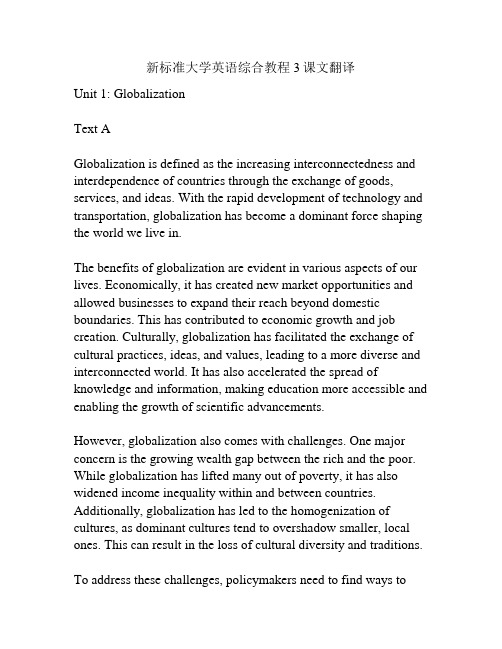
新标准大学英语综合教程3课文翻译Unit 1: GlobalizationText AGlobalization is defined as the increasing interconnectedness and interdependence of countries through the exchange of goods, services, and ideas. With the rapid development of technology and transportation, globalization has become a dominant force shaping the world we live in.The benefits of globalization are evident in various aspects of our lives. Economically, it has created new market opportunities and allowed businesses to expand their reach beyond domestic boundaries. This has contributed to economic growth and job creation. Culturally, globalization has facilitated the exchange of cultural practices, ideas, and values, leading to a more diverse and interconnected world. It has also accelerated the spread of knowledge and information, making education more accessible and enabling the growth of scientific advancements.However, globalization also comes with challenges. One major concern is the growing wealth gap between the rich and the poor. While globalization has lifted many out of poverty, it has also widened income inequality within and between countries. Additionally, globalization has led to the homogenization of cultures, as dominant cultures tend to overshadow smaller, local ones. This can result in the loss of cultural diversity and traditions. To address these challenges, policymakers need to find ways toensure that the benefits of globalization are shared by all. This includes implementing fair trade practices, promoting sustainable development, and investing in education and healthcare. Furthermore, it is crucial to celebrate and preserve cultural diversity, respecting and valuing the unique contributions of different societies.In conclusion, globalization has drastically transformed the world we live in, bringing both benefits and challenges. By addressing these challenges head-on, we can create a more inclusive and sustainable global community that embraces diversity and promotes shared prosperity.Text BOver the past few decades, globalization has become an undeniable reality in our society. It is driven by factors such as advancements in technology, international trade, and the rapid flow of capital and information.Globalization has had a profound impact on the economy, politics, culture, and daily life of people around the world. Economically, it has allowed businesses to expand their operations globally, leading to increased trade and investment. Politically, it has fostered cooperation among nations and encouraged the formation of international organizations and agreements. Culturally, globalization has facilitated the exchange of ideas, art, music, and cuisine, resulting in a more interconnected and multicultural world. In our daily lives, globalization has made it easier for us to travel, communicate, and access products and services from differentparts of the world.However, globalization has also faced criticism and resistance. Critics argue that it often benefits multinational corporations and developed countries at the expense of developing nations and local communities. They claim that globalization promotes exploitation, weakens labor rights, and leads to the loss of traditional industries and jobs.Despite the challenges and criticisms, it is clear that globalization is here to stay. As our world becomes increasingly interconnected, it is essential to find ways to maximize its benefits while mitigating its negative effects. This requires strong international cooperation and policies that promote sustainable and inclusive growth.In conclusion, globalization is a complex and multifaceted phenomenon that has significantly shaped our world. While it has brought about many positive changes, it also poses challenges that need to be addressed. Only through effective governance and cooperation can we harness the potential of globalization for the betterment of all.。
新标准大学英语综合教程3课文翻译和课后习题答案 Unit 6概要1

Exercises
10. Work in pairs and answer the questions.
1 What has been omitted in the elliptical sentence Dead solid still? The complete sentence might be we stood dead solid still.
1 If you are raring to go, are you eager to (a) leave, or (b) start an activity?
2 If you get your bearings, do you (a) lose your way, or (b) find out where you are?
Exercises
6 All of these thoughts were landing in my brain in a kind of flashpoint … What are these thoughts, and how do they contrast with the situation in the north tower? What do they tell us about Picciotto? The thoughts are about Picciotto’s family, job, the bagels, firefighters’ customs, his colleagues, the things his life consists of, his values, his bravery and yet his ordinariness.
For a firefighter arriving on the scene of a fire the first few minutes are usually the most (1)_c_h_a_o_t_ic_. He has to (2)_e_x_ti_n_g_u_i_sh_ the fire, he also needs to find out if human lives are in danger. When people are trapped inside a building he must act swiftly to prevent (3)__tr_a_g_e_d_y_, or, – in the (4) _n_ig_h_t_m_a_r_e_ scenario – to keep the death (5) __t_o_ll__ to a minimum. Actions like these require the (6) _u_t_m__o_st_degree of (7) _h_e_r_o_is_m__.
新标准大学英语综合教程第三册重点文章及翻译

Unit 1 Catching Crabs1 In the fall of our final year, our mood changed. The relaxed atmosphere of the preceding summer semester, the impromptu ball games, the boating on the Charles River, the late-night parties had disappeared, and we all started to get our heads down, studying late, and attendance at classes rose steeply again. We all sensed we were coming to the end of our stay here, that we would never get a chance like this again, and we became determined not to waste it. Most important of course were the final exams in April and May in the following year. No one wanted the humiliation of finishing last in class, so the peer group pressure to work hard was strong. Libraries which were once empty after five o'clock in the afternoon were standing room only until the early hours of the morning, and guys wore the bags under their eyes and their pale, sleepy faces with pride, like medals proving their diligence.2 But there was something else. At the back of everyone's mind was what we would do next, when we left university in a few months' time. It wasn't always the high flyers with the top grades who knew what they were going to do. Quite often it was the quieter, less impressive students who had the next stages of their life mapped out. One had landed a job in his brother's advertising firm in Madison Avenue, another had got a script under provisional acceptance in Hollywood. The most ambitious student among us was going to work as a party activist at a local level. We all saw him ending up in the Senate or in Congress one day. But most people were either looking to continue their studies, or to make a living with a white-collar job in a bank, local government, or anything which would pay them enough to have a comfortable time in their early twenties, and then settle down with a family, a mortgage and some hope of promotion.3 I went home at Thanksgiving, and inevitably, my brothers and sisters kept asking me what I was planning to do. I didn't know what to say. Actually, I did know what to say, but I thought they'd probably criticize me, so I told them what everyone else was thinking of doing.4 My father was watching me but saying nothing. Late in the evening, he invited me to his study. We sat down and he poured us a drink.5 "So?" he said.6 "Er … so what?"7 "So what do you really want to do?" he asked.8 My father was a lawyer, and I had always assumed he wanted me to go to law school, and follow his path through life. So I hesitated.9 Then I replied, “I want to travel, and I w ant to be a writer.”10 This was not the answer I thought he would expect. Travel? Where? A writer? About what? I braced myself for some resistance to the idea.11 There was a long silence.12 "Interesting idea," he said finally.13 There was another long silence.14 "I kind of wish I'd done that when I was your age."15 I waited.16 "You have plenty of time. You don't need to go into a career which pays well just at the moment. You need to find out what you really enjoy now, because if you don't, you won't besuccessful later."17 "So how do I do this?“18 He thought for a moment. Then he said, "Look, it's late. Let's take the boat out tomorrow morning, just you and me. Maybe we can catch some crabs for dinner, and we can talk more."19 It was a small motor boat, moored ten minutes away, and my father had owned it for years. Early next morning we set off along the estuary. We didn't talk much, but enjoyed the sound of the seagulls and the sight of the estuary coastline and the sea beyond.20 There was no surf on the coastal waters at that time of day, so it was a smooth half-hour ride until my father switched off the motor. "Let's see if we get lucky," he said, picked up a rusty, mesh basket with a rope attached and threw it into the sea.21 We waited a while, then my father stood up and said, "Give me a hand with this," and we hauled up the crab cage onto the deck.22 Crabs fascinated me. They were so easy to catch. It wasn't just that they crawled into such an obvious trap, through a small hole in the lid of the basket, but it seemed as if they couldn't be bothered to crawl out again even when you took the lid off. They just sat there, waving their claws at you.23 The cage was brimming with dozens of soft shell crabs, piled high on top of each other. "Why don't they try to escape?" I wondered aloud to my father.24 "Just watch them for a moment. Look at that one, there! He's trying to climb out, but every time the other crabs pull him back in," said my father.25 And we watched. The crab climbed up the mesh towards the lid, and sure enough, just as it reached the top, one of its fellow crabs reached out, clamped its claw onto any available leg, and pulled it back. Several times the crab tried to defy his fellow captives, without luck.26 "Now watch!" said my father. "He's starting to get bored with this game."27 Not only did the crab give up its lengthy struggle to escape, but it actually began to help stop other crabs trying to escape. He'd finally chosen an easy way of life.28 Suddenly I understood why my father had suggested catching crabs that morning. He looked at me. "Don't get pulled back by the others," he said. "Spend some time figuring out who you are and what you want in life. Look back at the classes you're taking, and think about which ones were most productive for you personally. Then think about what's really important to you, what really interests you, what skills you have. Try to figure out where you want to live, where you want to go, what you want to earn, how you want to work. And if you can't answer these questions now, then take some time to find out. Because if you don't, you'll never be happy."29 He paused.30 "So you want to travel?" he asked.31 "Yes," I replied.32 "Better get you a passport. And you want to be a writer?"33 "I think so."34 "Interesting choice. We've never had a writer in the family," he said.35 My father started the motor and we set off back home.抓螃蟹1 大学最后一年的秋天,我们的心情变了。
(2020年7月整理)新标准大学英语综合教程3课文翻译.doc

Unit 01 Working Holiday AbroadHow My Working Holiday Changed MeHayley1 Now that I have been home for a while and have had time to reflect on my working holiday in Vancouver, I’ve thought a lot about who I was before I left for Canada and who I am prese ntly.1 我回到家已经有一段时间了,有空回顾在温哥华的打工度假经历。
对于去加拿大之前的自我和如今的自我,我思考了很多。
2 Prior to leaving, I was not in a good place. I had suffered a lot of personal blows and felt emotionally stretched. I lost my grandma, my job and had two car crashes in five months. I needed something to change in my life, and that came in the form of a working holiday visa.2 出发前,我的境况不好。
个人生活上经受了许多打击,精神压力很大。
我失去了我的祖母,我的工作,5个月里遭遇两起车祸。
我需要生活得到改变,于是便有了打工度假签证这回事。
3 In less than three months I filled out the necessary paperwork, booked my plane ticket and fled Brisbane. I spent fifteen months living and working in Vancouver, Canada and eighteen months in total away from Australia. This is how that working holiday changed me and my life.3 在不到三个月的时间里,我填写了所需的表格,订好了机票,逃离布里斯班。
新标准大学英语综合教程3课文译文+课后练习答案

Unit 1抓螃蟹大学最后一年的秋天,我们的心情变了。
刚刚过去的夏季学期的轻松氛围、即兴球赛、查尔斯河上的泛舟以及深夜晚会都不见了踪影,我们开始埋头学习,苦读到深夜,课堂出勤率再次急剧上升。
我们都觉得在校时间不多了,以后再也不会有这样的学习机会了,所以都下定决心不再虚度光阴。
当然,下一年四五月份的期末考试最为重要。
我们谁都不想考全班倒数第一,那也太丢人了,因此同学们之间的竞争压力特别大。
以前每天下午五点以后,图书馆就空无一人了,现在却要等到天快亮时才会有空座,小伙子们熬夜熬出了眼袋,他们脸色苍白,睡眼惺忪,却很自豪,好像这些都是表彰他们勤奋好学的奖章。
还有别的事情让大家心情焦虑。
每个人都在心里盘算着过几个月毕业离校之后该找份什么样的工作。
并不总是那些心怀抱负、成绩拔尖的高材生才清楚自己将来要做什么,常常是那些平日里默默无闻的同学早早为自己下几个阶段的人生做好了规划。
有位同学在位于麦迪逊大道他哥哥的广告公司得到了一份工作,另一位同学写的电影脚本已经与好莱坞草签了合约。
我们当中野心最大的一位同学准备到地方上当一个政党活动家,我们都预料他最终会当上参议员或国会议员。
但大多数同学不是准备继续深造,就是想在银行、地方政府或其他单位当个白领,希望在20出头的时候能挣到足够多的薪水,过上舒适的生活,然后就娶妻生子,贷款买房,期望升职,过安稳日子。
感恩节的时候我回了一趟家,兄弟姐妹们免不了不停地问我毕业后有什么打算,我不知道该说什么。
实际上,我知道该说什么,但我怕他们批评我,所以只对他们说了别人都准备干什么。
父亲看着我,什么也没说。
夜深时,他叫我去他的书房。
我们坐了下来,他给我们俩各倒了杯饮料。
“怎么样?”他问“啊,什么怎么样?”“你毕业后到底想做什么?”他问道。
父亲是一名律师,我一直都认为他想让我去法学院深造,追随他的人生足迹,所以我有点儿犹豫。
过了会儿我回答说:“我想旅行,我想当个作家。
”我想这不是他所期待的答案。
新标准大学英语综合教程3课后翻译答案(共五则)

新标准大学英语综合教程3课后翻译答案(共五则)第一篇:新标准大学英语综合教程3课后翻译答案新标准大学英语综合教程3课后翻译答案Unit1 1 对于是否应该在大学期间详细规划自己的未来,学生们意见不一。
有的人认为对未来应该有一个明确的目标和详细的计划,为日后可能遇到的挑战做好充分的准备;有的人则认为不用过多考虑未来,因为未来难以预料。
(map out;brace oneself for;uncertainty) Students differ about whether they should have their future mapped out when they are still at university.Some think they should have a definite goal and detailed plan, so as to brace themselves for any challenges, whereas some others think they don’t have to think much about the future, because future is full of uncertainties.2 经过仔细检查,这位科学家得知自己患了绝症。
虽然知道自己将不久于人世,他并没有抱怨命运的不公,而是准备好好利用剩下的日子,争取加速推进由他和同事们共同发起的那个研究项目,以提前结项。
(tick away;make the best of;have a shot at) After a very careful check-up, the scientist was told he had got a fatal disease.Although he knew that his life was ticking away, instead of complaining about the fate, the scientist decided to make the best of the remaining days, and speed up the research project he and his colleagues initiated, and have a shot at completing it ahead of schedule.Unit3 1 随着婚礼的临近,苏珊变得非常焦虑。
新标准大学英语3课文翻译(中文)
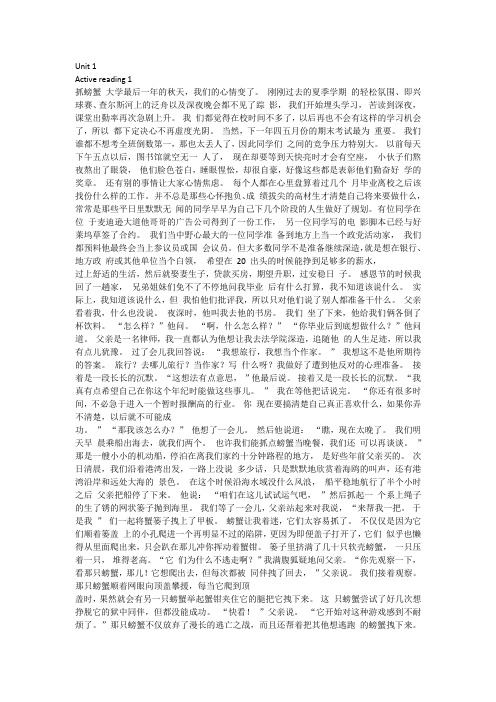
Unit 1Active reading 1抓螃蟹大学最后一年的秋天,我们的心情变了。
刚刚过去的夏季学期的轻松氛围、即兴球赛、查尔斯河上的泛舟以及深夜晚会都不见了踪影,我们开始埋头学习,苦读到深夜,课堂出勤率再次急剧上升。
我们都觉得在校时间不多了,以后再也不会有这样的学习机会了,所以都下定决心不再虚度光阴。
当然,下一年四五月份的期末考试最为重要。
我们谁都不想考全班倒数第一,那也太丢人了,因此同学们之间的竞争压力特别大。
以前每天下午五点以后,图书馆就空无一人了,现在却要等到天快亮时才会有空座,小伙子们熬夜熬出了眼袋,他们脸色苍白,睡眼惺忪,却很自豪,好像这些都是表彰他们勤奋好学的奖章。
还有别的事情让大家心情焦虑。
每个人都在心里盘算着过几个月毕业离校之后该找份什么样的工作。
并不总是那些心怀抱负、成绩拔尖的高材生才清楚自己将来要做什么,常常是那些平日里默默无闻的同学早早为自己下几个阶段的人生做好了规划。
有位同学在位于麦迪逊大道他哥哥的广告公司得到了一份工作,另一位同学写的电影脚本已经与好莱坞草签了合约。
我们当中野心最大的一位同学准备到地方上当一个政党活动家,我们都预料他最终会当上参议员或国会议员。
但大多数同学不是准备继续深造,就是想在银行、地方政府或其他单位当个白领,希望在20 出头的时候能挣到足够多的薪水,过上舒适的生活,然后就娶妻生子,贷款买房,期望升职,过安稳日子。
感恩节的时候我回了一趟家,兄弟姐妹们免不了不停地问我毕业后有什么打算,我不知道该说什么。
实际上,我知道该说什么,但我怕他们批评我,所以只对他们说了别人都准备干什么。
父亲看着我,什么也没说。
夜深时,他叫我去他的书房。
我们坐了下来,他给我们俩各倒了杯饮料。
“怎么样?”他问。
“啊,什么怎么样?”“你毕业后到底想做什么?”他问道。
父亲是一名律师,我一直都认为他想让我去法学院深造,追随他的人生足迹,所以我有点儿犹豫。
过了会儿我回答说:“我想旅行,我想当个作家。
新标准大学英语综合教程第三册重点文章及翻译

Unit 1 Catching Crabs1 In the fall of our final year, our mood changed. The relaxed atmosphere of the preceding summer semester, the impromptu ball games, the boating on the Charles River, the late-night parties had disappeared, and we all started to get our heads down, studying late, and attendance at classes rose steeply again. We all sensed we were coming to the end of our stay here, that we would never get a chance like this again, and we became determined not to waste it. Most important of course were the final exams in April and May in the following year. No one wanted the humiliation of finishing last in class, so the peer group pressure to work hard was strong. Libraries which were once empty after five o'clock in the afternoon were standing room only until the early hours of the morning, and guys wore the bags under their eyes and their pale, sleepy faces with pride, like medals proving their diligence.2 But there was something else. At the back of everyone's mind was what we would do next, when we left university in a few months' time. It wasn't always the high flyers with the top grades who knew what they were going to do. Quite often it was the quieter, less impressive students who had the next stages of their life mapped out. One had landed a job in his brother's advertising firm in Madison Avenue, another had got a script under provisional acceptance in Hollywood. The most ambitious student among us was going to work as a party activist at a local level. We all saw him ending up in the Senate or in Congress one day. But most people were either looking to continue their studies, or to make a living with a white-collar job in a bank, local government, or anything which would pay them enough to have a comfortable time in their early twenties, and then settle down with a family, a mortgage and some hope of promotion.3 I went home at Thanksgiving, and inevitably, my brothers and sisters kept asking me what I was planning to do. I didn't know what to say. Actually, I did know what to say, but I thought they'd probably criticize me, so I told them what everyone else was thinking of doing.4 My father was watching me but saying nothing. Late in the evening, he invited me to his study. We sat down and he poured us a drink.5 "So?" he said.6 "Er … so what?"7 "So what do you really want to do?" he asked.8 My father was a lawyer, and I had always assumed he wanted me to go to law school, and follow his path through life. So I hesitated.9 Then I replied, “I want to travel, and I w ant to be a writer.”10 This was not the answer I thought he would expect. Travel? Where? A writer? About what? I braced myself for some resistance to the idea.11 There was a long silence.12 "Interesting idea," he said finally.13 There was another long silence.14 "I kind of wish I'd done that when I was your age."15 I waited.16 "You have plenty of time. You don't need to go into a career which pays well just at the moment. You need to find out what you really enjoy now, because if you don't, you won't besuccessful later."17 "So how do I do this?“18 He thought for a moment. Then he said, "Look, it's late. Let's take the boat out tomorrow morning, just you and me. Maybe we can catch some crabs for dinner, and we can talk more."19 It was a small motor boat, moored ten minutes away, and my father had owned it for years. Early next morning we set off along the estuary. We didn't talk much, but enjoyed the sound of the seagulls and the sight of the estuary coastline and the sea beyond.20 There was no surf on the coastal waters at that time of day, so it was a smooth half-hour ride until my father switched off the motor. "Let's see if we get lucky," he said, picked up a rusty, mesh basket with a rope attached and threw it into the sea.21 We waited a while, then my father stood up and said, "Give me a hand with this," and we hauled up the crab cage onto the deck.22 Crabs fascinated me. They were so easy to catch. It wasn't just that they crawled into such an obvious trap, through a small hole in the lid of the basket, but it seemed as if they couldn't be bothered to crawl out again even when you took the lid off. They just sat there, waving their claws at you.23 The cage was brimming with dozens of soft shell crabs, piled high on top of each other. "Why don't they try to escape?" I wondered aloud to my father.24 "Just watch them for a moment. Look at that one, there! He's trying to climb out, but every time the other crabs pull him back in," said my father.25 And we watched. The crab climbed up the mesh towards the lid, and sure enough, just as it reached the top, one of its fellow crabs reached out, clamped its claw onto any available leg, and pulled it back. Several times the crab tried to defy his fellow captives, without luck.26 "Now watch!" said my father. "He's starting to get bored with this game."27 Not only did the crab give up its lengthy struggle to escape, but it actually began to help stop other crabs trying to escape. He'd finally chosen an easy way of life.28 Suddenly I understood why my father had suggested catching crabs that morning. He looked at me. "Don't get pulled back by the others," he said. "Spend some time figuring out who you are and what you want in life. Look back at the classes you're taking, and think about which ones were most productive for you personally. Then think about what's really important to you, what really interests you, what skills you have. Try to figure out where you want to live, where you want to go, what you want to earn, how you want to work. And if you can't answer these questions now, then take some time to find out. Because if you don't, you'll never be happy."29 He paused.30 "So you want to travel?" he asked.31 "Yes," I replied.32 "Better get you a passport. And you want to be a writer?"33 "I think so."34 "Interesting choice. We've never had a writer in the family," he said.35 My father started the motor and we set off back home.抓螃蟹1 大学最后一年的秋天,我们的心情变了。
新标准大学英语综合教程3summary(含U6R2 U7R1 有中文翻译)
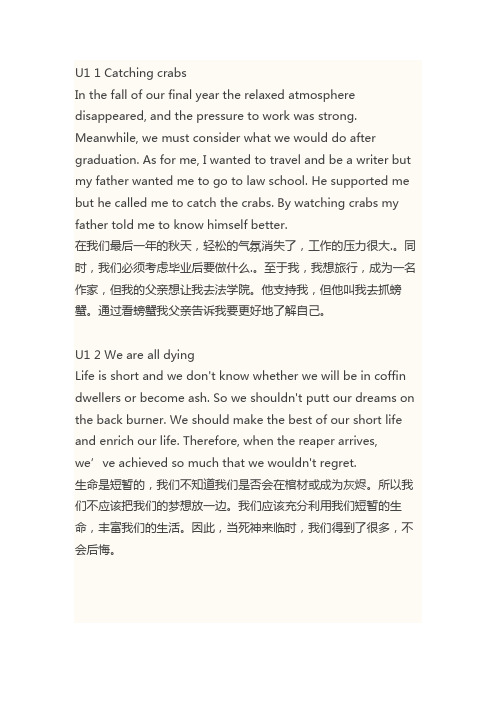
U1 1 Catching crabsIn the fall of our final year the relaxed atmosphere disappeared, and the pressure to work was strong. Meanwhile, we must consider what we would do after graduation. As for me, I wanted to travel and be a writer but my father wanted me to go to law school. He supported me but he called me to catch the crabs. By watching crabs my father told me to know himself better.在我们最后一年的秋天,轻松的气氛消失了,工作的压力很大.。
同时,我们必须考虑毕业后要做什么.。
至于我,我想旅行,成为一名作家,但我的父亲想让我去法学院。
他支持我,但他叫我去抓螃蟹。
通过看螃蟹我父亲告诉我要更好地了解自己。
U1 2 We are all dyingLife is short and we don't know whether we will be in coffin dwellers or become ash. So we shouldn't putt our dreams on the back burner. We should make the best of our short life and enrich our life. Therefore, when the reaper arrives, we’ve achieved so much that we wouldn't regret.生命是短暂的,我们不知道我们是否会在棺材或成为灰烬。
新标准大学英语综合教程3课文翻译(1-10单元30篇).
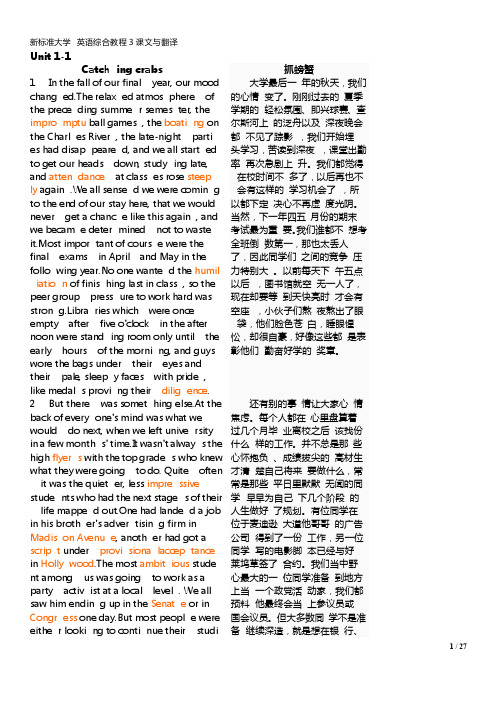
Unit 1-1Catching crabs1 In the fall of our finalyear, our mood changed.The relaxed atmosphereof the preceding summer semester, the impromptu ball games, the boating on the Charles River, the late-nightparties had disappeared, and we all started to get our headsdown, studying late, and attendanceat classes rose steeply again.We all sensed we were coming to the end of our stay here, that we wouldnever get a chance like this again, and we became determinednot to wasteit.Most important of course were the finalexamsin Apriland May in the following year.No one wanted the humil iation of finishing last in class, so the peer grouppressure to work hard was strong.Libraries whichwere once emptyafterfive o'clockin the afternoon were standing room only untilthe earlyhoursof the morning, and guys wore the bags undertheir eyes and theirpale, sleepy faceswith pride, like medals proving theirdiligence.2 But therewas something else.At the back of everyone's mind was what we woulddo next, when we left universityin a few months' time.It wasn't always the high flyers with the top grades who knew what they were goingto do. Quiteoften it was the quieter, less impressivestudents who had the next stages of their life mapped out.One had landed a job in his brother's advertising firm in Madison Avenue, another had got a script underprovisionalacceptancein Hollywood.The most ambitious student amongus was goingto work as a partyactivist at a locallevel. We all saw him ending up in the Senate or in Congress one day.But most people were either looking to continue theirstudi抓螃蟹大学最后一年的秋天,我们的心情变了。
新标准大学英语综合教程3课文翻译
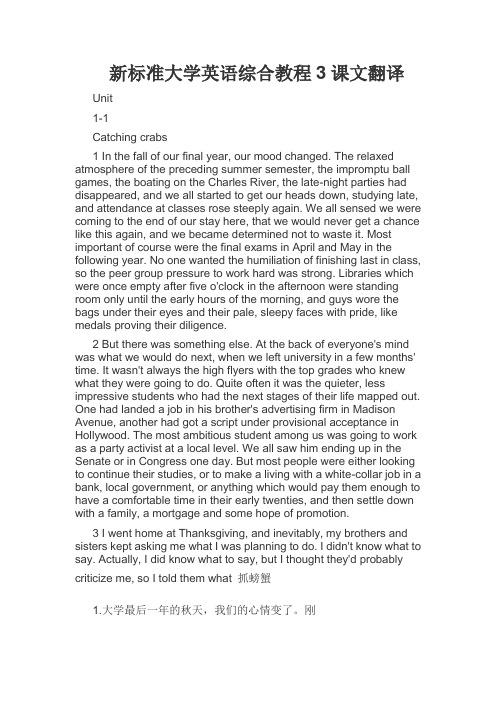
新标准大学英语综合教程3课文翻译Unit1-1Catching crabs1 In the fall of our final year, our mood changed. The relaxed atmosphere of the preceding summer semester, the impromptu ball games, the boating on the Charles River, the late-night parties had disappeared, and we all started to get our heads down, studying late, and attendance at classes rose steeply again. We all sensed we were coming to the end of our stay here, that we would never get a chance like this again, and we became determined not to waste it. Most important of course were the final exams in April and May in the following year. No one wanted the humiliation of finishing last in class, so the peer group pressure to work hard was strong. Libraries which were once empty after five o'clock in the afternoon were standing room only until the early hours of the morning, and guys wore the bags under their eyes and their pale, sleepy faces with pride, like medals proving their diligence.2 But there was something else. At the back of everyone's mind was what we would do next, when we left university in a few months' time. It wasn't always the high flyers with the top grades who knew what they were going to do. Quite often it was the quieter, less impressive students who had the next stages of their life mapped out. One had landed a job in his brother's advertising firm in Madison Avenue, another had got a script under provisional acceptance in Hollywood. The most ambitious student among us was going to work as a party activist at a local level. We all saw him ending up in the Senate or in Congress one day. But most people were either looking to continue their studies, or to make a living with a white-collar job in a bank, local government, or anything which would pay them enough to have a comfortable time in their early twenties, and then settle down with a family, a mortgage and some hope of promotion.3 I went home at Thanksgiving, and inevitably, my brothers and sisters kept asking me what I was planning to do. I didn't know what to say. Actually, I did know what to say, but I thought they'd probably criticize me, so I told them what 抓螃蟹1.大学最后一年的秋天,我们的心情变了。
- 1、下载文档前请自行甄别文档内容的完整性,平台不提供额外的编辑、内容补充、找答案等附加服务。
- 2、"仅部分预览"的文档,不可在线预览部分如存在完整性等问题,可反馈申请退款(可完整预览的文档不适用该条件!)。
- 3、如文档侵犯您的权益,请联系客服反馈,我们会尽快为您处理(人工客服工作时间:9:00-18:30)。
Unit 1Active reading 1抓螃蟹大学最后一年的秋天,我们的心情变了。
刚刚过去的夏季学期的轻松氛围、即兴球赛、查尔斯河上的泛舟以及深夜晚会都不见了踪影,我们开始埋头学习,苦读到深夜,课堂出勤率再次急剧上升。
我们都觉得在校时间不多了,以后再也不会有这样的学习机会了,所以都下定决心不再虚度光阴。
当然,下一年四五月份的期末考试最为重要。
我们谁都不想考全班倒数第一,那也太丢人了,因此同学们之间的竞争压力特别大。
以前每天下午五点以后,图书馆就空无一人了,现在却要等到天快亮时才会有空座,小伙子们熬夜熬出了眼袋,他们脸色苍白,睡眼惺忪,却很自豪,好像这些都是表彰他们勤奋好学的奖章。
还有别的事情让大家心情焦虑。
每个人都在心里盘算着过几个月毕业离校之后该找份什么样的工作。
并不总是那些心怀抱负、成绩拔尖的高材生才清楚自己将来要做什么,常常是那些平日里默默无闻的同学早早为自己下几个阶段的人生做好了规划。
有位同学在位于麦迪逊大道他哥哥的广告公司得到了一份工作,另一位同学写的电影脚本已经与好莱坞草签了合约。
我们当中野心最大的一位同学准备到地方上当一个政党活动家,我们都预料他最终会当上参议员或国会议员。
但大多数同学不是准备继续深造,就是想在银行、地方政府或其他单位当个白领,希望在20出头的时候能挣到足够多的薪水,过上舒适的生活,然后就娶妻生子,贷款买房,期望升职,过安稳日子。
感恩节的时候我回了一趟家,兄弟姐妹们免不了不停地问我毕业后有什么打算,我不知道该说什么。
实际上,我知道该说什么,但我怕他们批评我,所以只对他们说了别人都准备干什么。
父亲看着我,什么也没说。
夜深时,他叫我去他的书房。
我们坐了下来,他给我们俩各倒了杯饮料。
“怎么样?”他问。
“啊,什么怎么样?”“你毕业后到底想做什么?”他问道。
父亲是一名律师,我一直都认为他想让我去法学院深造,追随他的人生足迹,所以我有点儿犹豫。
过了会儿我回答说:“我想旅行,我想当个作家。
”我想这不是他所期待的答案。
旅行?去哪儿旅行?当作家?写什么呀?我做好了遭到他反对的心理准备。
接着是一段长长的沉默。
“这想法有点意思,”他最后说。
接着又是一段长长的沉默。
“我真有点希望自己在你这个年纪时能做这些事儿。
”我在等他把话说完。
“你还有很多时间,不必急于进入一个暂时报酬高的行业。
你现在要搞清楚自己真正喜欢什么,如果你弄不清楚,以后就不可能成功。
”“那我该怎么办?”他想了一会儿。
然后他说道:“瞧,现在太晚了。
我们明天早晨乘船出海去,就我们两个。
也许我们能抓点螃蟹当晚餐,我们还可以再谈谈。
”那是一艘小小的机动船,停泊在离我们家约十分钟路程的地方,是好些年前父亲买的。
次日清晨,我们沿着港湾出发,一路上没说多少话,只是默默地欣赏着海鸥的叫声,还有港湾沿岸和远处大海的景色。
在这个时候沿海水域没什么风浪,船平稳地航行了半个小时之后父亲把船停了下来。
他说:“咱们在这儿试试运气吧,”然后抓起一个系上绳子的生了锈的网状篓子抛到海里。
我们等了一会儿,父亲站起来对我说,“来帮我一把。
”于是我们一起将蟹篓子拽上了甲板。
螃蟹让我着迷,它们太容易抓了。
不仅仅是因为它们顺着篓盖上的小孔爬进一个再明显不过的陷阱,更因为即便盖子打开了,它们似乎也懒得从里面爬出来,只会趴在那儿冲你挥动着蟹钳。
篓子里挤满了几十只软壳螃蟹,一只压着一只,堆得老高。
“它们为什么不逃走啊?”我满腹狐疑地问父亲。
“你先观察一下,看那只螃蟹,那儿!它想爬出去,但每次都被同伴拽了回去,”父亲说。
我们接着观察。
那只螃蟹顺着网眼向顶盖攀援,每当它爬到顶盖时,果然就会有另一只螃蟹举起蟹钳夹住它的腿把它拽下来。
这只螃蟹尝试了好几次想挣脱它的狱中同伴,但都没能成功。
“快看!”父亲说。
“它开始对这种游戏感到不耐烦了。
”那只螃蟹不仅放弃了漫长的逃亡之战,而且还帮着把其他想逃跑的螃蟹拽下来。
它最终选择了一种轻松的活法。
我忽然明白了父亲为什么提议早上来抓螃蟹。
他看着我说:“你可别被别人拽下来哦。
花点时间想想你是哪一类人,你这一生希望得到什么,回顾一下你在大学修的课程,想想有哪些课对你个人来说最有益。
然后再想想什么对你最重要,什么最使你感兴趣,你有什么技能。
琢磨一下你想在哪里生活,你想去哪里,想挣多少钱,想做什么样的工作。
如果你现在不能回答这些问题,你就得花点时间去找出答案。
你不这样做的话,永远都不会幸福的。
”他停顿了一下。
“你想去旅行?”他接着问我。
“对,”我回答说。
“那就去申请护照吧。
你想当作家?”“对。
”“有趣的选择,我们家还没出过作家呢,”他说。
我父亲发动了马达,我们返航回家。
Unit2Active reading 1超人战争爆发的那一年,我在温斯罗普的安妮• F. 沃伦文法学校读五年级,那年冬天我获得了民防图标设计赛的冠军。
也就是在那个冬天,波拉•布朗买了新的防雪服,即便是13年后的今天,我仍然能清晰地记起那些精彩纷呈的日子,它们历历在目,犹如万花筒里看到的图案那样色彩斑斓。
我的家位于城里靠海湾的一侧,在洛根机场对面的约翰逊大道上。
每天晚上睡觉前,我都会跪在卧室朝西的窗户旁,眺望黑幽幽的海水那边波士顿城明亮闪烁的灯光。
夕阳将粉色的余晖洒在机场上空,浪涛的声音永远淹没在一架架飞机永无休止的嗡嗡声中。
我惊奇地望着跑道上的移动信标,看着那些闪烁的红灯、绿灯像流星般升起、降落,直到机场变得一片漆黑为止。
机场就是我的麦加,我的耶路撒冷。
我整夜都在做梦,梦见自己在空中飞行。
那正是我梦想斑斓的岁月。
妈妈认为我需要大量的睡眠,所以我每天上床睡觉时一点儿都不觉得累。
那是一天中最美好的时光,我可以躺下,在昏暗的暮色中慢慢进入梦乡,脑子里制造出许多奇异的梦来。
我的飞行梦像达利的风景画那么真实可信,以致于自己常常会在一阵惊吓中醒来,好像伊卡罗斯那样从天空中摔下来,虽然发现自己刚好掉到软软的床上,但也被吓得喘不过气来。
当超人开始侵入我的梦乡,并教给我飞行的技巧之后,我每夜的太空冒险便开始了。
超人身着耀眼的蓝色衣服,肩披随风飕飕作响的斗篷,经常从我身边呼啸而过。
他长得太像我的舅舅弗兰克了,舅舅那会儿正跟妈妈和我住在一起。
当超人的斗篷神奇地旋转时,我好像能听见上百只海鸥的振翅声,上千架飞机的马达轰鸣声。
我不是这个街区里唯一的超人崇拜者,在街的另一头,那个脸色苍白、有点书呆子气的男孩儿戴维•斯特令和我一样,热爱飞行的纯粹的诗意。
每天晚饭前,我们一起收听电台的超人故事,白天在上学的路上,我们自己设计出各种各样的冒险活动。
安妮• F. 沃伦文法学校是一座红砖楼,座落在远离主干道的一条黑色柏油街道上,学校四周是光秃秃的铺着碎石的操场。
戴维和我发现学校外面停车场附近有一个角落,那里是我们玩超人游戏的绝佳场所。
那条长长的过道通向学校又黑又脏的后门,非常适合玩意外抓捕和快速解救的游戏。
课间休息时,我和戴维可以大展身手了。
我们对在碎石操场上打棒球的男孩儿们视而不见,也不搭理那些在小山谷里一边玩躲球游戏一边咯咯傻笑的女孩儿们。
超人游戏让我们变得像两个逃犯似的,但也给了我们一种虚幻的优越感,我们甚至找尔登•费恩来充当恶棍。
他是街区里一个脸色苍白、胆小怕事的孩子,没有男孩儿愿意和他玩,因为一有人追他他就哭,而且老是自己摔倒在地,擦伤他那胖胖的膝盖。
一开始我们还得教尔登怎么扮演他的角色,可没过多久他就变成了一位发明虐刑的专家,甚至私下里悄悄实施他的刑罚。
他常常扯下苍蝇的翅膀,揪掉蚱蜢的腿,并把这些残废了的昆虫囚禁在瓶子里,藏到床底下,这样他就可以偷偷把它们拿出来,看着它们痛苦挣扎的样子。
戴维和我只在课间休息的时候和尔登玩,放学后我们就让他回家跟他的妈妈、棒棒糖以及那些无助的昆虫为伴。
那时候,弗兰克舅舅住在我们家,等着参军。
我肯定他和隐姓埋名的超人长得特别像。
戴维却看不出我舅舅和超人有多么相像,但他承认弗兰克舅舅是他这辈子所见过的最强壮的人,而且他会变很多戏法,比如用餐巾一盖上糖果,糖就没了,他还能倒立行走。
Unit3Active reading 1我们是怎样听音乐的我们都按照各自不同的能力来听音乐。
但为了便于分析,如果把听的整个过程分成几个组成部分,那么这个过程会更清晰一些。
从某种意义上来说,我们听音乐有三个不同的层次。
由于缺乏更好的术语,我们姑且把它们命名为:(1)感官层次;(2)表现层次;(3)纯音乐层次。
把听的过程机械地分割为以上三个假想的层次,唯一的好处是让我们更清楚地了解自己是怎样听音乐的。
听音乐最简单的方式是为了去获取乐声带来的纯粹的愉悦感,这是音乐的感官层次。
在这个层次上,我们只是听音乐,不做任何思考。
我们打开收音机,一边做着其他的事情,一边心不在焉地沉浸在音乐中。
乐声本身的魅力带我们进入一种无需思考的美妙心境。
令人意外的是,许多自认为是合格的音乐爱好者在听音乐时过多地使用了这一层次。
他们去听音乐会是为了忘却自我。
他们把音乐当成一种慰藉,一种逃避,由此他们进入了一个可以忘却日常生活的理想世界。
当然,他们也没有在思考音乐。
音乐允许他们离开现实,到另一个地方去做梦,因为音乐而做梦,做有关音乐的梦,却从没有真正欣赏过音乐。
的确,乐声的魅力是一种强大而原始的力量,但是你不该让它占据你过多的兴趣空间。
感官层次是音乐的一个重要层次,非常重要,但并不是音乐的全部。
音乐存在的第二个层次就是我所说的表现层次。
一提到这个问题,我们马上就进入到一个颇具争议的领域。
作曲家总是设法避开有关音乐表现方面的讨论。
斯特拉温斯基不是曾经声称他的音乐是一个“物体”,是一件有自我生命的“东西”,除了纯音乐性的存在之外没有任何别的含意吗?斯特拉温斯基这种不妥协的态度可能源于这样的一个事实:有那么多的人尝试着从众多的音乐作品中读出完全不同的含意。
确实,要准确地说出一部音乐作品的含意已经很难了,要肯定并确定地说出来,还要使每个人对你的解释都感到满意,是难上加难。
但我们不该因此走到另一个极端,不能去剥夺音乐“表现”的权利。
可能的话,你不妨听听巴赫的《平均律钢琴曲集》中的48个赋格主题。
依次地、一个个地听听其中的每一个主题,你很快就会意识到每个主题都反映了一个不同的情感世界,你很快也会意识到你越觉得某个主题美妙,就越难找到令你完全满意的字眼来描述它。
是的,你当然知道那个主题是欢快的还是悲伤的。
换句话说,你能够在脑海中勾勒出那个主题的情感框架。
那么就更仔细地听一下这个悲伤的主题吧,要明确悲伤的性质。
是悲观厌世的悲伤,还是无可奈何的悲伤?是时运不济的悲伤,还是强颜欢笑的悲伤?假设你很幸运,能用许多词句充分表达你对选中主题的确切理解。
但这仍然无法保证其他人对你的理解都感到满意,他们也完全没有必要感到满意。
重要的是,每个人能亲自感受某个主题的表现力,或以同样的方式去感受一部完整的音乐作品独特的表现力。
